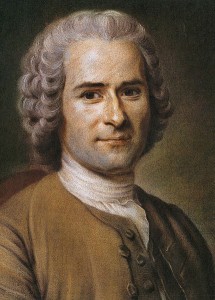Jean-Jacques Rousseau

Portrait of Jean-Jacques Rousseau (1712–1778)
by Maurice Quentin de La Tour Unknown, used under 
Jean-Jacques Rousseau (1712 – 1778) was a philosopher, author, and political theorist. He ranks as one of the greatest thinkers of the French Enlightenment, taking place during the 18th century. His though ranged widely, and while he was a great Enlightenment thinker, “he also had an influence on the Romantic movement, educational philosophy, and political theory” (Berleant, 2007). Rousseau is also thought to be connected to antislavery.
Major Works:
- “Discourse on the Arts and Sciences” (1750)
- “Discourse on Inequality” (1755)
- “Emile” (1762)
- “The Social Contract” (1762)
- “Letters Written from the Mount” (1764)
- “Confessions” (1770)
- Major Ideas:
- “Man is by nature good; society is the cause of corruption and vice” (Creed, 1999)
- “While society corrupts human nature, it also represents the possibility of its perfection in morality” (Creed, 1999)
References:
Berleant, R.(2007). Rousseau, Jean Jacques. In Encyclopedia of emancipation and abolition in the transatlantic world. Retrieved from https://ezproxy.butler.edu/login?qurl=http%3A%2F%2Fsearch.credoreference.com%2Fcontent%2Fentry%2Fsharpeeman%2Frousseau_jean_jacques%2F0
Creed, Constance. (1999). “Jean-Jacques Rousseau.” Great thinkers of the western
world.” 271. Retrieved from http://ic.galegroup.com/ic/whic/ReferenceDetailsPage/ReferenceDetailsWindow?failOverType=&query=&prodId=WHIC&windowstate=normal&contentModules=&mode=view&displayGroupName=Reference&limiter=&u=butleru&currPage=&disableHighlighting=false&displayGroups=&sortBy=&source=&search_within_results=&p=WHIC%3AUHIC&action=e&catId=&activityType=&scanId=&documentId=GALE%7CA55035824
